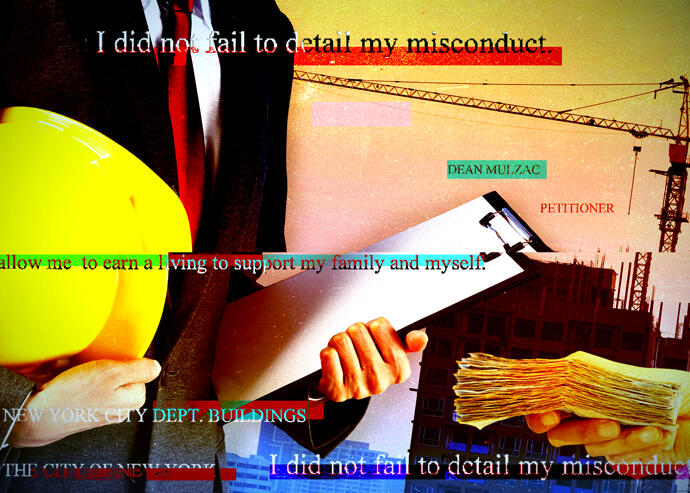
(Illustration by Kevin Rebong for The Real Deal)
A former city building inspector is suing the Department of Buildings after it denied him a professional license for lacking moral character.
Dean Mulzac was convicted of a misdemeanor in 2017 for agreeing to help a property owner get a driveway permit and accepting a small piece of jewelry. He was sentenced to one year of probation, fined $250 and ordered to resign as a Queens construction and development inspector after 13 years at the Department of Buildings.
“If everybody that has a misdemeanor conviction cannot work or get a license, a lot of people will be out of work and it’s not good for society,” said Mulzac’s attorney, Martin Druyan.
Mulzac, 56, sued his former agency last week. He maintains that he has good moral character and claims the department is retaliating because he was a plaintiff in a 2015 class-action racial discrimination lawsuit against it.
In 2020, the lawsuit’s 10 plaintiffs shared a $500,000 settlement, although Mulzac, because of his conviction, got just $15,000.
Mulzac says a construction superintendent license would allow him to make a living and support his family. His lawsuit notes that the jewelry that cost him his job was appraised and found to be worthless. Mulzac had written to the agency that the jewelry had cost between $1 and $100.
“A misdemeanor conviction does not define moral unfitness,” said Druyan. “You can be a police officer and have a misdemeanor conviction. You can work in many civil service and government jobs and have a misdemeanor conviction.”
The Department of Buildings assesses the moral character of applicants for a construction superintendent registration license but does not explicitly state that a misdemeanor conviction is grounds for denial.
“Although the department recognizes and appreciates the state’s interest in encouraging the licensure of persons previously convicted, the prevention of corruption and dishonest dealing with the construction industry is of paramount interest to the department,” wrote William Hinckley, executive director of licensing and exams at the Department of Buildings, to Mulzac in a denial letter.
Hinckley also said that in his application, Mulzac did not adequately detail his past misconduct, failing to acknowledge advising the owner on how to circumvent the city’s inspection procedures.
However, Mulzac said in his lawsuit that he never pulled strings or helped the homeowner evade rules. Mulzac admits that he should not have accepted the gift, which is why he pleaded guilty to official misconduct.
A Department of Buildings spokesperson declined to comment, citing pending litigation. The New York City Law Department did not respond to repeated requests for comment.



